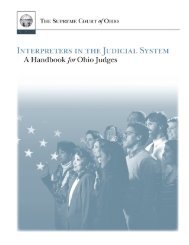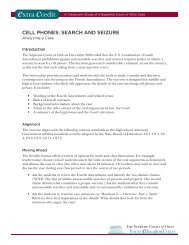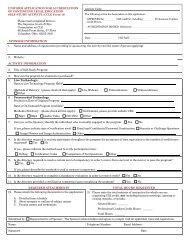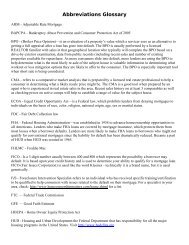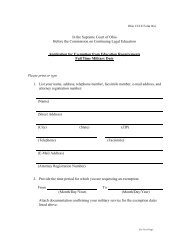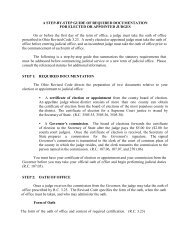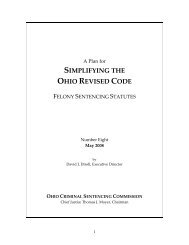Planning for Parenting Time: Ohio's Guide for Parents Living Apart
Planning for Parenting Time: Ohio's Guide for Parents Living Apart
Planning for Parenting Time: Ohio's Guide for Parents Living Apart
Create successful ePaper yourself
Turn your PDF publications into a flip-book with our unique Google optimized e-Paper software.
Special Issues<br />
<strong>Parents</strong> also should understand that sometimes there are problems that need to be worked on<br />
through counseling. For example, some children may have serious problems getting used to a<br />
parent’s new partner and his or her children. There also are children who are caught in the<br />
middle of their parents’ conflict, who may take sides with one parent and refuse to do what<br />
any parent or judge tells them to do about spending time with the other parent. In situations<br />
like this, professional help usually is necessary. If there are concerns that the children do not<br />
want to go because they are being abused or neglected, Child Protective Services should be<br />
contacted.<br />
CONTACT WITH AN INCARCERATED PARENT<br />
An incarcerated parent still is a parent to a child. In many cases, a child has a legal right and<br />
an emotional need to remain in contact with the parent in prison. It is important to understand<br />
that the needs of the child may be different from the residential parent’s needs regarding<br />
contact with the incarcerated parent. Be<strong>for</strong>e a child visits the parent in jail or prison, the<br />
residential parent should talk to the child about what to expect. After the visit, the child<br />
should be encouraged to talk openly about thoughts and feelings regarding the visit and the<br />
residential parent should respond sensitively. For planning purposes, the residential parent<br />
should review the relevant policies <strong>for</strong> minor child visits of the Ohio Department of<br />
Rehabilitation and Correction found on its Web page at<br />
http://www.drc.ohio.gov/web/visiting.htm.<br />
HIGH CONFLICT<br />
Many parents work well together, but some do not. Some parents argue with each other when<br />
they exchange the children or talk to each other on the phone. They sometimes blame the<br />
other parent <strong>for</strong> their problems, and, in extreme cases, some parents tell the children how bad<br />
the other parent is.<br />
When parents do these things, children can develop emotional and behavioral problems. They<br />
may become fearful, thinking that they are the cause of their parents’ fighting, finding<br />
themselves having to choose between their parents or developing low self-esteem.<br />
For parents who cannot work cooperatively, parallel parenting is a way <strong>for</strong> them to raise their<br />
child with little contact between each other. Each parent makes day-to-day decisions about<br />
the child while the child is with the parent. With parallel parenting, communication between<br />
the parents is limited, except in emergencies, and usually is in writing. A therapist or a parent<br />
coordinator often helps parents handle parallel parenting arrangements.<br />
In some counties, parents can attend high-conflict resolution classes or cooperative parenting<br />
classes. In these classes, parents learn that any continuing conflict between them likely will<br />
have a long-term negative effect on their children. They also learn skills to be better parents.<br />
68




